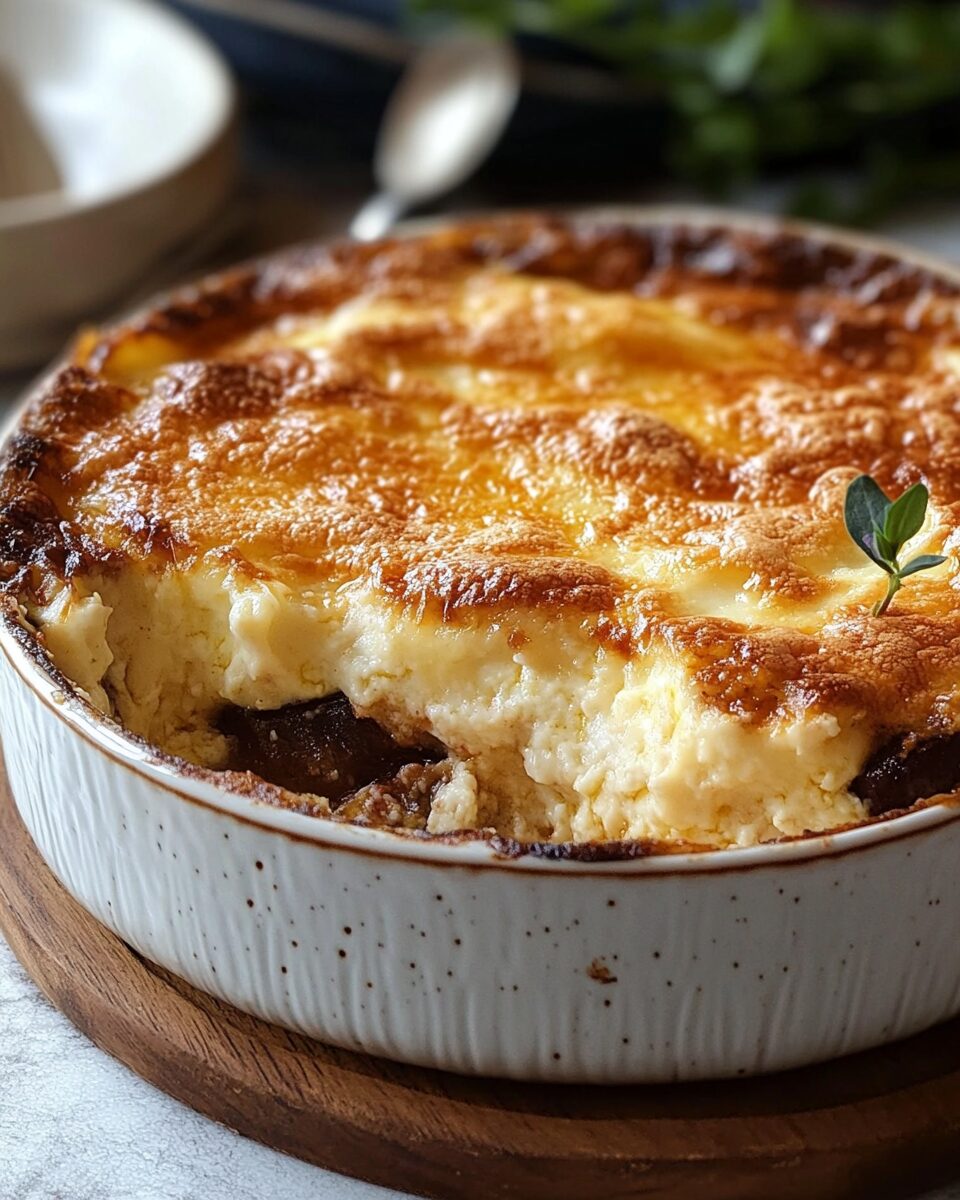This Passover-friendly eggplant moussaka offers a delightful twist on the traditional Greek dish. Layers of tender eggplant are paired with a savory, spiced filling and topped with a rich, creamy sauce. It’s the perfect dish for those looking for a flavorful, kosher option to enjoy during the holiday.
FULL RECIPE
Ingredients
- 2 medium eggplants, sliced into rounds
- 2 tablespoons olive oil
- 1 large onion, chopped
- 2 garlic cloves, minced
- 1 lb ground beef or lamb
- 1 can (14 oz) crushed tomatoes
- 1 teaspoon ground cinnamon
- 1 teaspoon ground cumin
- 1 teaspoon dried oregano
- Salt and pepper to taste
- 1/2 cup fresh parsley, chopped
- 2 cups almond milk (or another non-dairy milk)
- 3 tablespoons potato starch
- 1/4 cup olive oil (for the sauce)
- 1/2 teaspoon nutmeg
- 2 tablespoons tahini
- 1/4 cup chopped fresh parsley (for garnish)
Directions
- Preheat the oven to 375°F (190°C).
- Arrange the eggplant slices on a baking sheet, brush with olive oil, and roast in the oven for about 20 minutes, flipping halfway through until golden brown.
- In a large skillet, heat olive oil over medium heat. Add the chopped onion and garlic and sauté for 2-3 minutes until softened.
- Add the ground meat to the skillet and cook until browned, breaking it up with a spoon.
- Stir in the crushed tomatoes, cinnamon, cumin, oregano, salt, and pepper. Let the mixture simmer for 10-15 minutes, until the sauce thickens. Remove from heat and stir in the chopped parsley.
- In a saucepan, whisk together the almond milk, potato starch, olive oil, and nutmeg. Cook over medium heat until thickened, stirring constantly. Remove from heat and stir in the tahini.
- In a greased baking dish, layer half of the roasted eggplant slices at the bottom. Top with the meat mixture and then the remaining eggplant slices.
- Pour the creamy sauce over the eggplant layers, spreading it evenly.
- Bake the moussaka in the oven for 30-40 minutes, until the top is golden and bubbling.
- Let cool for 10 minutes before serving. Garnish with fresh parsley.
Nutritional Information
- Calories: 350 per serving
- Protein: 22g
- Carbohydrates: 20g
- Fat: 20g
- Fiber: 8g
- Sugar: 10g
- Sodium: 600mg
Cultural Significance of Moussaka
Moussaka, a traditional Greek dish, has roots that date back to the Ottoman Empire. It has evolved over the centuries, with various countries adopting their own versions. For those celebrating Passover, this dish can be adapted to suit dietary restrictions while maintaining the essence of its Mediterranean flavors. Eggplant moussaka offers a rich, satisfying alternative to heavier meat-based casseroles and is perfect for a Passover feast.
Passover Adaptation of Moussaka
When preparing for Passover, it’s important to focus on ingredients that are kosher for the holiday. Traditional moussaka often contains béchamel sauce made with milk or butter. In this Passover-friendly version, non-dairy ingredients such as almond milk and tahini are used, making it suitable for those following kosher guidelines. This variation allows those celebrating Passover to indulge in a comforting and familiar dish without compromising on flavor or tradition.
Eggplant: A Versatile Ingredient for Passover
Eggplant is one of the most versatile vegetables that can be incorporated into a variety of dishes. For Passover, it serves as a great base for moussaka because it is naturally kosher and can be used as a substitute for layers of potatoes or pasta in traditional moussaka. The eggplant adds a rich, meaty texture that complements the spiced filling and creamy sauce, making it a standout in any holiday meal.
Why Choose Non-Dairy Ingredients
When making Passover-friendly moussaka, it’s essential to use non-dairy ingredients for the sauce. Almond milk is an excellent alternative to regular dairy milk because it mimics the creamy texture needed to bind the casserole. Adding tahini to the sauce also enhances its richness and brings a subtle nutty flavor. These dairy-free substitutions ensure that the dish is kosher for those following the restrictions of Passover.
The Importance of Layering in Moussaka
Moussaka is all about the layers—each one contributing to the overall flavor profile of the dish. The roasted eggplant slices form the base, while the spiced meat mixture provides a hearty filling. The creamy, thick sauce ties everything together and creates a deliciously indulgent experience. Layering the ingredients allows the flavors to meld together as the dish bakes, resulting in a comforting and satisfying meal.
Making Moussaka Ahead of Time
One of the best features of this Passover-friendly moussaka is its ability to be made ahead of time. In fact, it often tastes better the next day as the flavors continue to develop. You can prepare the moussaka the day before your holiday meal, store it in the fridge, and simply bake it on the day of serving. This time-saving tip is especially helpful when preparing a large meal for a crowd, allowing you to focus on other dishes without stressing about last-minute cooking.
Perfect Pairings with Passover Moussaka
Moussaka pairs beautifully with a variety of side dishes. A simple Greek salad made with tomatoes, cucumbers, olives, and red onion is a refreshing complement to the richness of the moussaka. You could also serve the moussaka alongside roasted vegetables, such as carrots or zucchini, or with a light herb-infused quinoa salad. These sides balance the heaviness of the moussaka while offering vibrant, fresh flavors.
Serving Moussaka at Your Passover Seder
Moussaka makes an excellent main course for the Passover Seder, especially for guests who are looking for a hearty dish that is also kosher. The unique combination of roasted eggplant, seasoned meat, and creamy non-dairy sauce will appeal to both meat-lovers and vegetarians alike. This dish provides an alternative to more traditional Passover fare, such as brisket or chicken, and adds an element of surprise and delight to the meal.
Customizing the Meat Filling
While traditional moussaka often uses ground lamb or beef, there is plenty of room for customization. If you prefer a leaner option, you can substitute ground turkey or chicken for the meat. Additionally, those following a vegetarian or vegan diet can easily omit the meat entirely, replacing it with a combination of lentils, mushrooms, or other vegetables to create a flavorful filling that still provides the hearty texture needed for a satisfying dish.
The Role of Herbs and Spices
The spices used in this Passover-friendly moussaka are key to achieving the depth of flavor that characterizes this Mediterranean dish. Ground cinnamon, cumin, and oregano bring warmth and complexity to the meat filling, while fresh parsley adds a burst of freshness. The combination of these herbs and spices creates a fragrant, savory filling that contrasts beautifully with the mild taste of the eggplant and the richness of the creamy sauce.
Why Roasting the Eggplant is Crucial
Roasting the eggplant slices before assembling the moussaka is an important step that enhances the flavor and texture of the dish. Roasting caramelizes the natural sugars in the eggplant, giving it a slightly smoky, sweet flavor that complements the savory meat filling. Additionally, roasting helps to remove excess moisture from the eggplant, ensuring that the moussaka doesn’t become soggy during baking.
The Influence of Mediterranean Cuisine
Mediterranean cuisine is known for its vibrant flavors and emphasis on fresh ingredients. Moussaka is a prime example of this culinary tradition, with its focus on vegetables, olive oil, and herbs. By adapting this dish for Passover, you’re bringing a piece of Mediterranean culture into your holiday meal, allowing you to experience the rich, diverse flavors of the region while keeping the dish kosher.
Eggplant Moussaka as a Comfort Food
Eggplant moussaka is the epitome of comfort food, offering layers of warmth and flavor that are perfect for any holiday meal. The dish is hearty enough to satisfy even the largest appetites, yet its complexity of flavors keeps each bite interesting. Whether you’re serving it for Passover or any other occasion, moussaka provides the ultimate comforting experience that everyone at the table will enjoy.
Balancing Flavors with Non-Dairy Milk
Non-dairy milk, such as almond milk, is an ideal choice for this Passover-friendly moussaka because it is naturally light but still provides the creaminess needed for the sauce. Almond milk has a subtle nutty flavor that enhances the overall dish without overpowering the other ingredients. When combined with potato starch and tahini, it forms a rich, velvety sauce that binds the layers of eggplant and meat together.
The Importance of the Right Baking Dish
To ensure that your Passover-friendly moussaka turns out perfectly, it’s important to choose the right baking dish. A medium-sized casserole dish works well, providing enough room for the layers of eggplant and meat while allowing the sauce to bubble and set. Make sure to grease the baking dish with olive oil or cooking spray to prevent sticking and ensure easy removal of the moussaka once it’s done baking.
The Role of Parsley in Garnishing
Fresh parsley serves as the perfect garnish for eggplant moussaka, adding a touch of color and freshness to the rich and hearty dish. Sprinkling chopped parsley over the top of the baked moussaka just before serving brings an extra layer of flavor, cutting through the richness of the sauce and adding a hint of brightness. The parsley also enhances the visual appeal of the dish, making it an attractive centerpiece for your Passover meal.
Making Moussaka More Nutritious
For those looking to make their Passover-friendly moussaka even healthier, there are several ways to tweak the recipe. You can reduce the amount of oil used in roasting the eggplant or opt for leaner meat, such as ground turkey. Adding more vegetables, such as zucchini or mushrooms, to the meat filling can also increase the nutritional content of the dish without sacrificing flavor. By making these simple adjustments, you can create a lighter, more nutrient-dense version of moussaka.
Storing Leftovers
Moussaka keeps well as leftovers, and it can be stored in the refrigerator for up to three days. For the best texture, it’s recommended to store the moussaka without the sauce on top, as the sauce may separate when reheated. To reheat, simply place the moussaka in the oven or microwave, and enjoy it as a leftover treat for the next few days. It can also be frozen for longer storage, making it a convenient option for meal prep.
Conclusion
Passover-friendly eggplant moussaka is the perfect dish to serve during the holiday, offering a flavorful and hearty option that caters to dietary restrictions. Its rich, savory filling and creamy sauce make it a crowd-pleaser for all guests, whether they are following kosher guidelines or simply looking for a satisfying vegetarian alternative. With its Mediterranean roots and adaptability, this dish will become a beloved addition to your Passover celebrations for years to come.






